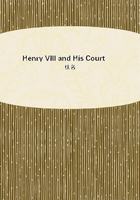
第72章 THE PRISONER.(2)
When this passage was built, Henry was still young, and possessed yet a heart. At that time, he loved not merely his wives, but his friends and servants also--specially Cromwell, the all-powerful minister. He then resided at Whitehall, and Henry in the royal apartments of the Tower. But Henry was always longing for his favorite; and so Cromwell one day surprised him with this subterranean passage, the construction of which had occupied a hundred men a whole year. Ah, ah, the king was then very much moved, and thanked his powerful minister for this surprise with tears and hugs. There passed scarcely a day that Henry did not go to Cromwell through this passage. So he saw each day how the palace of Whitehall became more and more splendid and glorious; and when he returned to the Tower, he discovered that this residence was altogether unworthy of a king; but that his minister lived by far more magnificently than the King of England. That, queen, was the cause of Cromwell's fall! The king wanted Whitehall. The sly Cromwell noticed it, and made him a present of his gem, the palace on whose construction and decoration he had labored ten years. Henry accepted the present; but now Cromwell's fall was irrevocable. The king could not, of course, forgive Cromwell for having dared to offer him a present so valuable, that Henry could not or would not repay it. He remained, therefore, Cromwell's debtor; and since this tormented and vexed him, he swore Cromwell's ruin. When Henry moved into Whitehall, it was concluded that Cromwell must ascend the scaffold. Ah, the king is such an economical builder! A palace costs him nothing but the head of a subject. With Cromwell's bead be paid for Whitehall; and Wolsey died for Hampton Court.""Not on the scaffold, though, John.""Oh, no; Henry preferred merely to break his heart, and not his head. First, he had that wonderful pleasure-villa, Hampton Court, with all its treasures, presented him by Wolsey; then he removed him from all his offices, and deprived him of all his honors. Finally, he was to go to the Tower as a prisoner; but he died on his way thither. No, you are right! Wolsey did not die on the scaffold, he was put to death much more slowly and more cruelly. He was not killed with the sword, but pricked to death with pins!""Did you not say, John, that you had travelled this way once before?""Yes, queen, and I did it to bid farewell to the noblest of men, and the truest of friends, Thomas More! I begged and besought Cromwell so long that he had compassion on my anguish, and allowed me to go through this passage to Thomas More, that I might at least receive the blessing and last kiss of affection of this saint. Ah, queen, speak no more of it to me! From that day I became a fool; for I saw it was not worth the trouble to be an honest man, when such men as More are executed as criminals. Come, queen, let us go on!""Yes, on, John!" said she, rising. "But do you know then whither we are going?""Ah, queen, do I not then know you? and did I not tell you that Anne Askew is to be stretched upon the rack to-morrow, unless she recant?""I see that you have understood me," said she, giving him a friendly nod. "Yes, I am going to Anne Askew.""But how will you, without being seen and discovered, find out her cell?""John, even the unhappy have friends. Yes, the queen herself has a few; and so chance, or it may be even God's will, has so arranged matters, that Anne Askew is occupying, just at this time, that small room in which the secret passage terminates.""Is she alone in that room?""Yes, all alone. The guard stands without before the door.""And should they hear you, and open the door?""Then without doubt I am lost, unless God supports me."They walked on in silence, both too much occupied with their own thoughts to interrupt them by conversation.
But this long, extended walk at length wearied Catharine. She leaned exhausted against the wall.
"Will you do me a favor, queen?" asked John Heywood. "Permit me to carry you. Your little feet can bear you no farther; make me your feet, your majesty!"She refused with a friendly smile. "No, John, these are the passion-stations of a saint; and you know one must make the round of them in the sweat of his face, and on his knees.""Oh, queen, how noble and how courageous you are!" exclaimed John Heywood. "You do good without display, and you shun no danger, if it avails toward the accomplishment of noble work.""Yet, John," said she, with a bewitching smile, "I dread danger; and just on that account I begged you to accompany me. I shudder at the long, desolate way, at the darkness and grave-like stillness of this passage. Ah, John, I thought to myself, if I came here alone, the shades of Anne Boleyn and Catharine would be roused from their sleep by me who wear their crown; they would hover about me, and seize me by the hand and lead me to their graves, to show me that there is yet room there for me likewise. You see, then, that I am not at all courageous, but a cowardly and trembling woman.""And nevertheless, you came, queen.""I reckoned on you, John Heywood. It was my duty to risk this passage, to save, perchance, the life of the poor enthusiastic girl.